高中英语 Unit 1 Living wellSection Ⅲ Grammar复习动词不定式教学案 新人教版选修7
- 格式:doc
- 大小:174.02 KB
- 文档页数:9

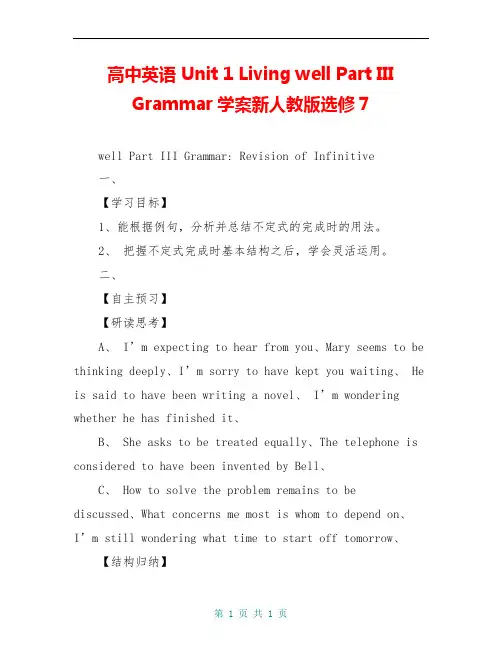
高中英语 Unit 1 Living well Part III Grammar学案新人教版选修7well Part III Grammar: Revision of Infinitive一、【学习目标】1、能根据例句,分析并总结不定式的完成时的用法。
2、把握不定式完成时基本结构之后,学会灵活运用。
二、【自主预习】【研读思考】A、I’m expecting to hear from you、Mary seems to be thinking deeply、I’m sorry to h ave kept you waiting、 He is said to have been writing a novel、I’m wondering whether he has finished it、B、 She asks to be treated equally、The telephone is considered to have been invented by Bell、C、 How to solve the problem remains to be discussed、What concerns me most is whom to depend on、I’m still wondering what time to start off tomorrow、【结构归纳】1、不定式有四种时态的变化,一般时____________,表_________________的动作;进行时________________,表_________________的动作;完成时__________________,表____________的动作;完成进行时_______________,表______________________。
2、不定式的四种时态中,只有_____种时态有相应的被动语态,即___________时的被动语态___________________和_____________时的被动语态_____________________。
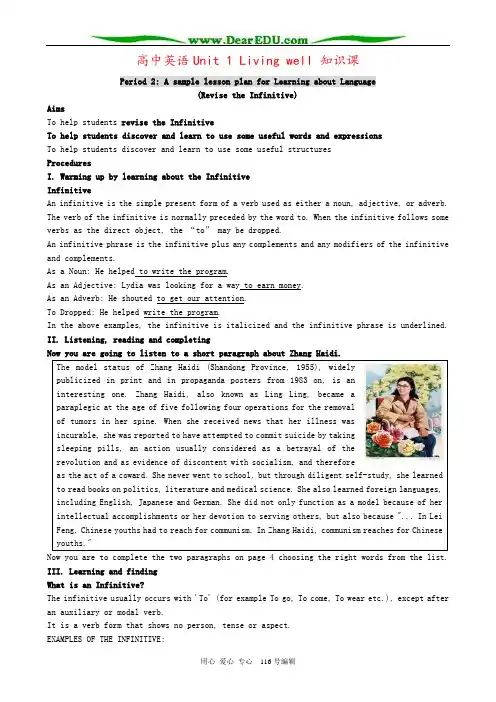
高中英语Unit 1 Living well 知识课Period 2: A sample lesson plan for Learning about Language(Revise the Infinitive)AimsTo help students revise the InfinitiveTo help students discover and learn to use some useful words and expressionsTo help students discover and learn to use some useful structuresProceduresI. Warming up by learning about the InfinitiveInfinitiveAn infinitive is the simple present form of a verb used as either a noun, adjective, or adverb. The verb of the infinitive is normally preceded by the word to. When the infinitive follows some verbs as the direct object, the “to” may be dropped.An infinitive phrase is the infinitive plus any complements and any modifiers of the infinitive and complements.As a Noun: He helped to write the program.As an Adjective: Lydia was looking for a way to earn money.As an Adverb: He shouted to get our attention.To Dropped: He helped write the program.In the above examples, the infinitive is italicized and the infinitive phrase is underlined. II. Listening, reading and completingNow you are going to listen to a short paragraph about Zhang Haidi.The model status of Zhang Haidi (Shandong Province, 1955), widelypublicized in print and in propaganda posters from 1983 on, is aninteresting one. Zhang Haidi, also known as Ling Ling, became aparaplegic at the age of five following four operations for the removalof tumors in her spine. When she received news that her illness wasincurable, she was reported to have attempted to commit suicide by takingsleeping pills, an action usually considered as a betrayal of therevolution and as evidence of discontent with socialism, and thereforeas the act of a coward. She never went to school, but through diligent self-study, she learned to read books on politics, literature and medical science. She also learned foreign languages, including English, Japanese and German. She did not only function as a model because of her intellectual accomplishments or her devotion to serving others, but also because "... In Lei Feng, Chinese youths had to reach for communism. In Zhang Haidi, communism reaches for Chinese youths."Now you are to complete the two paragraphs on page 4 choosing the right words from the list. III. Learning and findingWhat is an Infinitive?The infinitive usually occurs with 'To' (for example To go, To come, To wear etc.), except after an auxiliary or modal verb.It is a verb form that shows no person, tense or aspect.EXAMPLES OF THE INFINITIVE:I had to goI must goI want to singTo err is humanYou don't know herYou may comeThe following verb forms are derived from the Infinitive:i/ Imperative (same as Infinitive but without 'To')ii/ Present Simple (same as Infinitive without 'To' but the third person singular takes 's') iii/ Present Participle or Gerund (add 'ing')Now read the text once again to find and copy on page 5 all sentences which contain examples of the Infinitive.IV. Making sentences with the Infinitive1. To have a muscle disease is very boring for any people.2. I do not want to make my body very weak.3. To climb stairs, you need some tips.4. I don’t want you to drop things while going along the street.5. To bump into a car is dangerous.6. To make life well worth living you have to learn to live with what you have.7. He is looking for ways not to get worse or get older.8. He stayed on to adapt to the life there.9. My motto is to live one day at a time.10.He likes to climb tree, play football and dream about becoming rich overnight.11.I hope to represent my country in the World Cup.12.Getting weaker and weaker, I have no strength even to get out of bed.13.To go into hospital for tests, I have to miss a lot of school.14.He learns to look at small things under a microscope.15.To get out of breath, you just have to run a short way.V. Closing down by reading a poem in EnglishDisabledHe sat in a wheeled chair, waiting for dark,And shivered in his ghastly suit of grey,Legless, sewn short at elbow. Through the parkVoices of boys rang saddening like a hymn,Voices of play and pleasure after day,Till gathering sleep had mothered them from him.About this time Town used to swing so gayWhen glow-lamps budded in the light blue trees,And girls glanced lovelier as the air grew dim,-In the old times, before he threw away his knees.Now he will never feel again how slimGirls' waists are, or how warm their subtle hands.All of them touch him like some queer disease.There was an artist silly for his face,For it was younger than his youth, last year.Now, he is old; his back will never brace;He's lost his colour very far from here,Poured it down shell-holes till the veins ran dry, And half his lifetime lapsed in the hot raceAnd leap of purple spurted from his thigh.One time he liked a blood-smear down his leg,After the matches, carried shoulder-high.It was after football, when he'd drunk a peg,He thought he'd better join. - He wonders why. Someone had said he'd look a god in kilts,That's why; and maybe, too, to please his Meg, Aye, that was it, to please the giddy jiltsHe asked to join. He didn't have to beg;Smiling they wrote his lie: aged nineteen years.Germans he scarcely thought of; all their guilt, And Austria's, did not move him. And no fearsOf Fear came yet. He drought of jewelled hillsFor daggers in plaid socks; of smart salutes;And care of arms; and leave; and pay arrears;Esprit de corps; and hints for young recruits.And soon, he was drafted out with drums and cheers.Some cheered him home, but not as crowds cheer Goal. Only a solemn man who brought him fruitsThanked him; and then enquired about his soul.Now, he will spend a few sick years in institutes, And do what things the rules consider wise,And take whatever pity they may dole.Tonight he noticed how the women's eyesPassed from him to the strong men that were whole. How cold and late it is! Why don't they comeAnd put him into bed? Why don't they come?Wilfred Owen。
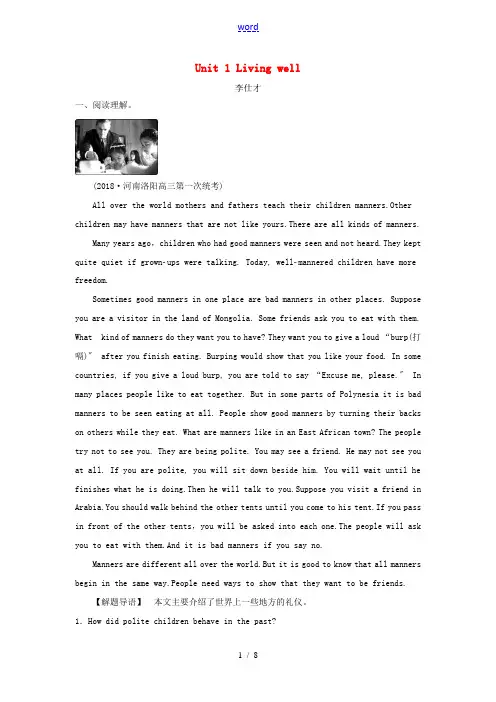
Unit 1 Living well李仕才一、阅读理解。
(2018·河南洛阳高三第一次统考)All over the world mothers and fathers teach their children manners.Other children may have manners that are not like yours.There are all kinds of manners.Many years ago,children who had good manners were seen and not heard.They kept quite quiet if grownups were talking. Today, wellmannered children have more freedom.Sometimes good manners in one place are bad manners in other places. Suppose you are a visitor in the land of Mongolia. Some friends ask you to eat with them. What kind of manners do they want you to have? They want you to give a loud “burp(打嗝)〞 after you finish eating. Burping would show that you like your food. In some countries, if you give a loud burp, you are told to say “Excuse me, please.〞 In many places people like to eat together. But in some parts of Polynesia it is bad manners to be seen eating at all. People show good manners by turning their backs on others while they eat. What are manners like in an East African town? The people try not to see you. They are being polite. You may see a friend. He may not see you at all. If you are polite, you will sit down beside him. You will wait until he finishes what he is doing.Then he will talk to you.Suppose you visit a friend in Arabia.You should walk behind the other tents until you come to his tent.If you pass in front of the other tents,you will be asked into each one.The people will ask you to eat with them.And it is bad manners if you say no.Manners are different all over the world.But it is good to know that all manners begin in the same way.People need ways to show that they want to be friends.【解题导语】本文主要介绍了世界上一些地方的礼仪。
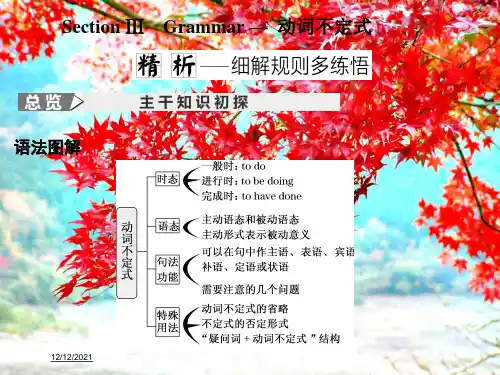
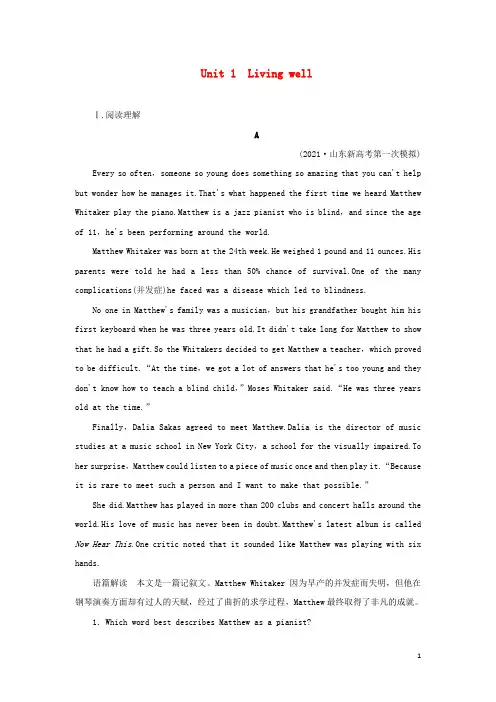
Unit 1 Living wellⅠ.阅读理解A(2021·山东新高考第一次模拟) Every so often,someone so young does something so amazing that you can't help but wonder how he manages it.That's what happened the first time we heard Matthew Whitaker play the piano.Matthew is a jazz pianist who is blind,and since the age of 11,he's been performing around the world.Matthew Whitaker was born at the 24th week.He weighed 1 pound and 11 ounces.His parents were told he had a less than 50% chance of survival.One of the many complications(并发症)he faced was a disease which led to blindness.No one in Matthew's family was a musician,but his grandfather bought him his first keyboard when he was three years old.It didn't take long for Matthew to show that he had a gift.So the Whitakers decided to get Matthew a teacher,which proved to be difficult.“At the time,we got a lot of answers that he's too young and they don't know how to teach a blind child,”Moses Whitaker said.“He was three years old at the time.”Finally,Dalia Sakas agreed to meet Matthew.Dalia is the director of music studies at a music school in New York City,a school for the visually impaired.To her surprise,Matthew could listen to a piece of music once and then play it.“Because it is rare to meet such a person and I want to make that possible.”She did.Matthew has played in more than 200 clubs and concert halls around the world.His love of music has never been in doubt.Matthew's latest album is called Now Hear This.One critic noted that it sounded like Matthew was playing with six hands.语篇解读本文是一篇记叙文。
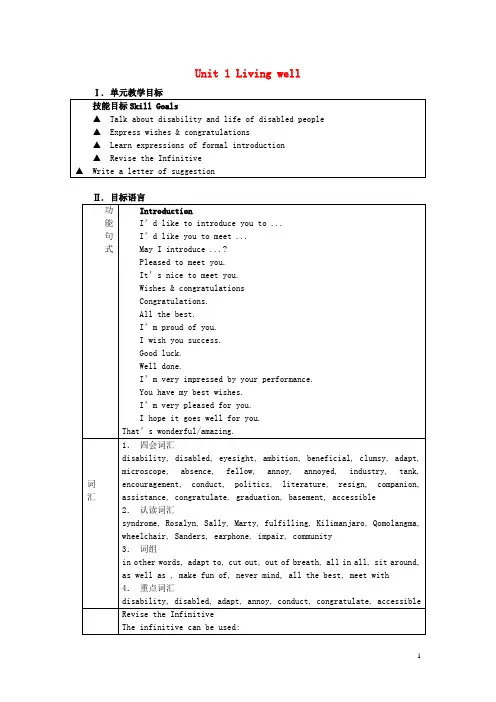
Unit 1 Living wellⅠ. 单元教学目标技能目标Skill Goals▲Talk about disability and life of disabled people ▲Express wishes & congratulations▲Learn expressions of formal introduction▲Revise the Infinitive▲Write a letter of suggestionⅡ. 目标语言功能句式IntroductionI’d like to introduce you to ...I’d like you to meet ...May I introduce ...?Pleased to meet you.It’s nice to meet you.Wishes & congratulationsCongratulations.All the best.I’m proud of you.I wish you success.Good luck.Well done.I’m very impressed by your performance.You have my best wishes.I’m very pleased for you.I hope it goes well for you.That’s wonderful/amazing.词汇1.四会词汇disability, disabled, eyesight, ambition, beneficial, clumsy, adapt, microscope, absence, fellow, annoy, annoyed, industry, tank, encouragement, conduct, politics, literature, resign, companion, assistance, congratulate, graduation, basement, accessible2.认读词汇syndrome, Rosalyn, Sally, Marty, fulfilling, Kilimanjaro, Qomolangma, wheelchair, Sanders, earphone, impair, community3.词组in other words, adapt to, cut out, out of breath, all in all, sit around, as well as , make fun of, never mind, all the best, meet with4.重点词汇disability, disabled, adapt, annoy, conduct, congratulate, accessible Revise the InfinitiveThe infinitive can be used:结构1. as the subject2. as the predicative3. as the object4. as the object complement5. as the adverbial6. as the attribute重点句子1. …but I am very outgoing and have learned to adapt to my disability. P22. Every time I returned after an absence, I felt stupid because I was behind the others. P23. All in all, I have a good life. P24. Just accept them for whom they are and give them encouragement to live as rich and full a life as you do. P3Ⅲ. 教材分析和教材重组1. 教材分析本单元以残疾和残疾人的生活为话题,介绍了一些残疾人凭借顽强的毅力和社会的关爱克服生活中的种种困难,以积极的态度面对人生挑战的故事。

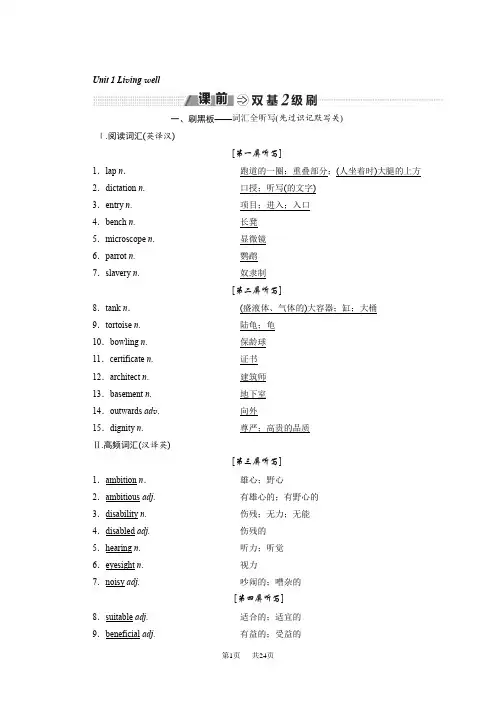
Unit 1 Li v ing w ell一、刷黑板——词汇全听写(先过识记默写关)Ⅰ.阅读词汇(英译汉)[第一屏听写]1.lap n.跑道的一圈;重叠部分;(人坐着时)大腿的上方2.dictation n. 口授;听写(的文字)3.entry n. 项目;进入;入口4.bench n. 长凳5.microscope n. 显微镜6.parrot n. 鹦鹉7.slavery n. 奴隶制[第二屏听写]8.tank n.(盛液体、气体的)大容器;缸;大桶9.tortoise n. 陆龟;龟10.bowling n. 保龄球11.certificate n. 证书12.architect n. 建筑师13.basement n. 地下室14.outwards ad v. 向外15.dignity n. 尊严;高贵的品质Ⅱ.高频词汇(汉译英)[第三屏听写]1.ambition n.雄心;野心2.ambitious adj.有雄心的;有野心的3.disability n. 伤残;无力;无能4.disabled adj.伤残的5.hearing n. 听力;听觉6.eyesight n. 视力7.noisy adj.吵闹的;嘈杂的[第四屏听写]8.suitable adj.适合的;适宜的9.beneficial adj.有益的;受益的10.clumsy adj.笨拙的11.outgoing adj.外向的;友好的;外出的;离开的12.adapt v t.使适应;改编13.absence n. 缺席;不在某处14.fellow adj.同伴的;同类的n. 同伴;同志;伙伴[第五屏听写]15.annoy v t.使……不悦;惹恼16.annoyed adj.颇为生气的17.annoyance n. 烦恼18.firm n. 公司adj.结实的;坚固的;坚定的19.psychology n. 心理(学)20.psychologically ad v. 心理(学)地;精神上地[第六屏听写] 21.encouragement n.鼓励;奖励22.conduct n. 行为;品行v t.指挥;管理;主持23.politics n. 政治(学)24.abolish v t.废除;废止25.software n. 软件26.resign v i.&v t.辞职;辞去(工作、职位等)[第七屏听写]27.literature n.文学(作品);著作;文献28.companion n. 同伴;伙伴29.assistance n. 协助;援助30.congratulate v t.祝贺;庆贺31.congratulation n. 祝贺;贺词32.graduation n. 毕业;毕业典礼33.adequate adj.足够的;充分的[第八屏听写]34.access n.(接近的)方法;通路;可接近性35.accessible adj.可接近的;可进入的;可使用的36.handy adj.方便的;有用的37.row n. 一行;一排v t. & v i.划(船)38.exit n. 出口;离开;退场39.approval n. 赞成;认可[第九屏听写]40.profit n.收益;利润;盈利41.community n. 社区;团体;社会42.all_the_best (口语)(祝你)一切顺利43.meet_with 遇到;经历;会晤44.all_in_all 总而言之45.in_other_words 换句话说46.adapt_to 适合[第十屏听写]47.cut_out切去;省略;停止(做某事) 48.out_of_breath 上气不接下气49.sit_around 闲坐着50.as_well_as 和;也51.in_many_ways 在很多方面52.make_fun_of 取笑53.never_mind 不必担心二、刷清单——热身自盘点(再过基本应用关) (一)核心单词(二)常用短语(三)经典句式near the entrance to the cinema.在影院入口处的附近安排厕所会让残疾人顾客感觉更加方便。
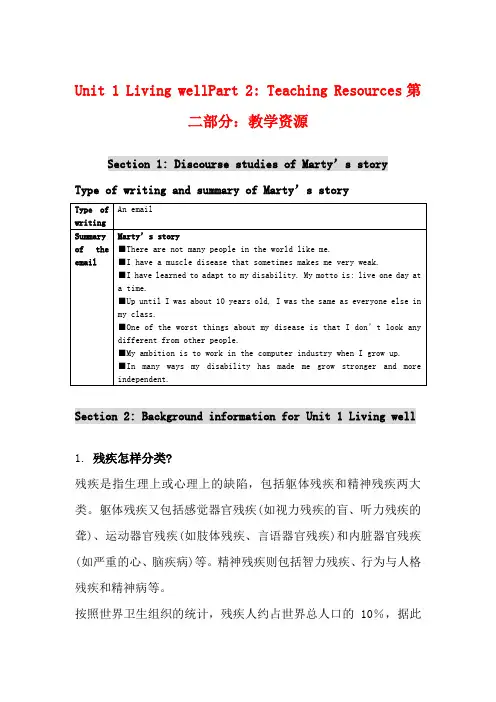
Unit 1 Living wellPart 2: Teaching Resources第二部分:教学资源Section 1: Discourse studies of Marty’s storyType of writing and summary of Marty’s storySection 2: Background information for Unit 1 Living well1. 残疾怎样分类?残疾是指生理上或心理上的缺陷,包括躯体残疾和精神残疾两大类。
躯体残疾又包括感觉器官残疾(如视力残疾的盲、听力残疾的聋)、运动器官残疾(如肢体残疾、言语器官残疾)和内脏器官残疾(如严重的心、脑疾病)等。
精神残疾则包括智力残疾、行为与人格残疾和精神病等。
按照世界卫生组织的统计,残疾人约占世界总人口的10%,据此推算,全世界残疾人约5亿。
我国于1987年4月进行的全国29个省、直辖市、自治区的残疾人抽样调查结果表明,我国残疾人占总人口的4.90%,据此推算,全国五类残疾人总数约为5164万人,其中约有听力言语残疾者1770万人,智力残疾者1017万人,肢体残疾者755万人,视力残疾者755万人,精神残疾者194万人,综合残疾者673万人。
现在全国人口已达12亿多人,按4.90%推算,残疾人也达到了6000多万人,而且由于自然环境和社会环境的变化,每天都会增加新的残疾人,这些人的心理康复问题也就关系着全社会的文明与进步。
2. Infinitive (动词不定式) 小结As Subject and Predictive (用作主语和表语)做主语,如:To master a foreign language is no easy job.但在当代英语中,不定式做主语置于句首的不多,常用先行词it 作形式主语,而将真实主语不定式移置谓语之后,即用句型"It +(be)+ adj./n.+ to v",如:It is foolish to make a decision without knowing all the facts.It's a pleasure to talk with you.如果是疑问句或感叹句,则只能用上述句型,如:How much did it cost you to repair the car?What a magnificent view it was to overlook the valley at the top of the mountain!作表语,如:The most important thing is to put theory into practice.不定式作表语通常要带to,但当主语部分含有do的某种形式时,to可省略,如:All we have to do is push the button.As Object (用作宾语)动词的宾语:能以不定式作宾语的动词很多,常用的有afford, agree, ask, attempt, beg, begin, bother, care, choose, decide, demand, desire, dislike, like, expect, fail, fear, forget, hate, help, intend, learn, love, manage, mean, offer, plan, prefer, prepare, pretend, refuse, remember, start, threaten, want, wish等,如:Laser science began to develop in 1958.如作宾语的不定式后有补足语时,用先行词it作形式宾语,而将真实宾语不定式移置补足语之后,即用"V + it + Co + to V"句型,如:I find it a pleasure to talk with you.Do you think it possible to finish the work today?介词的宾语:介词but, except, besides (= except)和than可用不定式作宾语,如:The enemy had no choice but to surrender.在谓语动词中含有do的一定形式时,或can't but和can't help but后接不定式时,不定式符号to省略,如:She did nothing but (except) weep.Whenever he asks me for help, I can't (help) but go.As Complement (用作补足语)动词宾语的补足语,如:The doctor warned me not to smoke and drink.在表示感觉的动词如see, look at, watch, hear, listen to, feel, notice等,以及在使役动词如make, have, let后的宾语补足语要省略to; help和find后的可省也可不省to,如:I saw him enter the store.He helped me (to) move the chairs.介词宾语的补足语,如:It is right for them to leave now.It was kind of you to help us.He shouted to them to stop arguing.主语的补足语,如:Everybody is expected to do his duty.John was appointed to be in charge of the sales department.主语补足语的to不省略,如:Mary's father was seen to return after dark.I was made to feel at easeIndicating Purpose/Result (表示目的和结果)不定式修饰动词表示目的,如:One should eat to live, not live to eat.为了更加突出或明确表示目的,不定式还可放在句首或用in order to, so as to的结构,如:To catch up with the advanced nations, we must make still greater efforts.We started early in order to catch the first train.We should do physical and chemical experiments so as to know the properties of molecules and atoms.不定式修饰动词、形容词和副词表示结果: 修饰形容词和副词时常用too … to, (not)enough to, so … as to, such … as to结构,如:What have you done to hurt her so much?He knows too little to speak on the subject.I'm not familiar enough with him to ask him for help.The temperature is so high as to change water into steam. The solution has reached such a temperature as not to need to be heated any more.不定式前面和only连用表示没有意想到的结果,如:They lifted a rock only to drop it on their own feet. Modifying Adjective (修饰形容词)不定式修饰表示心情状态的形容词表示原因,如:[He was grieved to hear that his old friend was seriously ill.不定式修饰一些形容词表示范围、情况,这类形容词主要有clever, comfortable, considerate, cruel, difficult, easy, foolish, (un)fortunate, free, good, hard, interesting, lucky, pleasant, proud, quick, right, rude, slow, (un)wise, wrong 等,如:You were foolish not to follow her advice.上述的某些形容词(如easy, difficult, good, hard, interesting)作表语,其后的不定式被视为省略了逻辑主语,因此不定式用主动形式表被动意思,如:English is hard (for me) to learn. (不用to be learnt) Mary is easy (by someone else) to deceive. (不用to be deceived)修饰上述形容词的不定式如与句子主语呈动宾关系,不定式是不及物动词时要带介词,但介词后不能再带宾语,如:Alice is easy to get along with. (不能去掉with,也不能在with 后加her)不定式修饰形容词作宾语,这类形容词常见的有:(un)able, afraid, anxious, content, determined, eager, (un)fit, impatient, ready, (un)willing, worthy等,如:He is eager to become a policemanAs Postmodifier in a Noun Phrase (后位修饰名词)不定式作定语都应放在它所修饰的名词或代词后面。
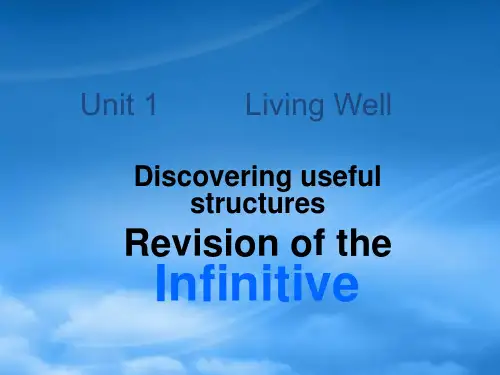
教学设计学情分析1)本单元的话题是围绕“残疾人和他们的生活”展开的,对于高中学生而言,该话题容易引起他们的思想共鸣,能够激发其学习兴趣,激励学生克服困难,以积极的态度面对人生。
同时提高学生理解,尊重,关心,帮助残疾人的意识。
2)对于我班学生而言,他们完全能够通过自学,了解主旨大意,故事内容。
也能够掌握重点单词和短语。
但对于课文某些段落的理解存在困难,主要原因是某些长难句的句式结构不清楚,不能正确翻译句意。
因此,课前预习就特别重要。
3)课前,会提前发给学生预习学案。
主要是让同学们熟悉和掌握课文中出现的字词句;提前预习课文,提高课堂效率。
并要求学生对于预习成果自我评价,找出问题,以改进自己的学习方法,明确学习方向。
4)课上通过预设问题的回答,对文章进行整体理解。
长难句的分析和翻译,以及高考题的链接,帮助学生理解语法项目,提高实际运用的能力。
5)课下要求学生将本节课学到的知识运用到纸面上,写成文章,使学生的知识目标和情感目标得以达成。
效果分析通过本节课的授课过程和高考题的评测链接的结果来看,绝大多数学生很好的完成了学习目标,但也存在一些问题。
部分学生对于长难句句子结构的分析,句意的准确翻译还是存在困难。
不能根据句子结构快速背诵长难句。
这样应该使课堂节奏慢下来,让学生有足够的时间背诵和理解消化。
Summary中的第5题学生没有填上,第12题所填答案错误,说明学生对于文章的理解还不够,对于形容词作状语这一语法点还不够清楚。
日后的学习应该注意语法点在文章中的讲解和理解运用。
教材分析本课时是本单元的第一课时,内容包括热身(Warming up),读前(Pre-reading),阅读(Reading)和理解(Comprehending) 四个部分。
读前热身(Warming up & Pre-reading)部分:看图阅读,了解一些残疾人士所取得的成就,并组织简短讨论。
阅读理解(Reading & Comprehending)部分:由残疾人马蒂·菲尔丁在网页上讲述自己的故事,他因为患了一种至今还无法认识的肌肉疾病,从而身心备受摧残,但痛苦的磨练也帮助他变得更加坚强,更好地认识人生,决心要过好人生的每一天。
Unit 1 Living well1.3 Grammar & WritingGrammar: 复习动词不定式一、动词不定式概述1.动词不定式是由"to+动词原形"构成(有时可以省略to)。
动词不定式的否定形式是"not+动词不定式"(not不与助动词连用)。
2.动词不定式在句子中不能充当谓语,没有人称和数的变化。
3.动词不定式具有名词、形容词和副词等的功能,可在句中作多种句子成分。
4.动词不定式具有动词的特点,可以有自己的宾语和状语,组成动词不定式短语。
二、动词不定式的句法功能1.动词不定式作主语。
(1)可以直接作主语。
☞To see is to believe.眼见为实。
(2)用it作形式主语,真正的主语即不定式放在后面。
☞It’s wrong to make fun of others.取笑别人是错误的。
【名师点津】在“It is+adj.+不定式复合结构”句型中,当其中的形容词用来说明不定式逻辑主语的性格特点时,要由of引出逻辑主语,不能用for。
这类形容词主要有bold,brave, careful, careless, clever, considerate, cruel, foolish, honest, kind, nice, rude, stupid,silly, thoughtful, wise等。
☞It is very kind of you to help me.你帮我真是太好了。
2.动词不定式作宾语。
(1)不定式作宾语时,往往跟在某些及物动词后面,常见的有:afford, agree, ask, decide, desire, expect, fail, hope,manage, promise, pretend, plan, intend, refuse, wish等。
☞He pretended to be reading.他假装正在读书。
☞I’ve decided to go abroad now.现在我已决定出国。
Unit 1 Living wellSectionⅢ—Grammar课后篇巩固提升一、句型转换1.It is impossible that a child can lift such a heavy box. It is impossible such a heavy box.2.It happened that you had known each other before.You happened each other before.3.It was said that he had been told about the news.He was said about the news.4.The teacher made the student stand all the time.The student all the time by the teacher.5.They saw her enter the room.She enter the room by them.二、完成句子1.他太激动了,以至于说不出话来。
He was .2.我们知道她研究这个问题有好几年了。
She is known on the problem for many years.3.他好似正在吃什么东西。
He seems something.4.她觉得有必要重申她的立场。
She found reassert her position.5.我从家里一路走到图书馆,不料图书馆已经关门了。
I walked all the way from home to the library,it closed.三、阅读理解A(2019·)By the end of the century,if not sooner,the world’s oceans will be bluer and greener thanks to a warming climate,according to a new study.At the heart of the phenomenon lie tiny marine microorganisms(海洋微生物) called phytoplankton.Because of the way light reflects off the organisms,these phytoplankton create colourful patterns at the ocean surface.Ocean colour varies from green to blue,depending on the type and concentration of phytoplankton.Climate change will fuel the growth of phytoplankton in some areas,while reducing it in otherspots,leading to changes in the ocean’s appeara nce.Phytoplankton live at the ocean surface,where they pull carbon dioxide(二氧化碳)into the ocean while giving off oxygen.When these organisms die,they bury carbon in the deep ocean,an important process that helps to regulate the global climate.But phytoplankton are vulnerable to the ocean’s warming trend.Warming changes key characteristics of the ocean and can affect phytoplankton growth,since they need not only sunlight and carbon dioxide to grow, but also nutrients.Stephanie Dutkiewicz,a scientist in MIT’s Center for Global Change Science,built a climate model that projects changes to the oceans throughout the century.In a worldthat warms up by 3 ℃,it found that multiple changes to the colour of the oceans would occur.The model projects that currently blue areas with little phytoplankton could become even bluer.But in some waters,such as those of the Arctic,a warming will make conditions riper for phytoplankton,and these areas will turn greener.“Not only are the quantities of phytoplankton in the ocean changing,〞she said,“but the type of phytoplankton is changing.〞And why does that matter?Phytoplankton are the base of the food web.If certain kinds begin to disappear from the ocean,Dutkiewicz said,“it will change the type of fish that will be able to survive.〞Those kinds of changes could affect the food chain.Whatever colour changes the ocean experiences in the coming decades will probably be too gradual and unnoticeable,but they could mean significant changes.“It’ll be a while before we can statistically show that the changes are happening because of climate change,〞Dutkiewicz said,“but the change in the colour of the ocean will be one of the early warning signals that we really have changed our planet.〞1.What are the first two paragraphs mainly about?A.The various patterns at the ocean surface.B.The cause of the changes in ocean colour.C.The way light reflects off marine organisms.D.The efforts to fuel the growth of phytoplankton.,这两段主要介绍了海洋颜色发生变化的原因。
Period 3 GrammarTeaching aims1.Students will be able to recognize the infinitives and know the exact meanings o f them. 2.Students will be able to use these structures correctly.Teaching proceduresStep 1RevisionAsk several students to retell Marty's Marty's mini biography on the PowerPoint.My mini biographyName Marty FieldingStatus High school studentHealth Developed a muscle disease at the age of 10,very weak,cannot do things like normal peopleInterests and Hobbies ·Enjoying writing and computer programming·Going to the movies and football matches with friends·Spending a lot of time with my pets—two rabbits,a parrot,a tank full of fish and a tortoiseAmbition To work for a firm that develops computer softwareMotto Live one day at a timeStep 2Discovering useful structures1.基本概念不定式是动词的一种非谓语形式,没有人称和数的变化,而且不能单独用作谓语,但仍旧有动词的特点,即可有自己的宾语和状语,构成不定式短语,使用频率较高。
Unit 1 Living WellSection III Learning about language & Using language学习目标:熟记重点单词和短语并能运用。
学习重点:在真实的语境中使用所学短语。
学习难点:课文中长难句。
学习过程生命课堂—互动探究一. The writers use polite forms in the letter on page 8. Polite forms are used to encouragethe reader to take the ideas seriously. Read the passage on page 8 and underline the examples of the polite forms.Examples: I hope you will not mind me writing to ask…I wonder if…二.经典句子I read in the newspaper today that you are to be the architect for the new Bankstown cinema. 今天我从报纸上了解到,您将成为班克斯敦新电影院的建筑设计师。
【拓展】该句用了be to do结构, 该结构用法总结如下:(1)表示按照计划或根据安排将要做某事,可用在条件或时间状语从句中。
We are to hold a party this weekend.这个周末我们要举办一个晚会。
(2)表示义务,建议,职责等。
You are not to do that. 不需你那样做。
You are to report the accident to the police.你应该将这次事故报警。
(3)表示不可避免将要发生的事或命中注定的事。
This experience is to change his life.这次经历必将改变他的人生。
Unit 1 Living wellSection Ⅲ Grammar-复习动词不定式语法图解探究发现用所给词的适当形式填空1.Unfortunately, the doctors don't know how to_make (make) me better, but I am very outgoing and have learned to_adapt (adapt) to my disability.2.Then I started to_get (get) weaker and weaker, until I could only enjoy football from a bench at the stadium.3.Even after all that, no one could give my disease a name and it is difficult to_know (know) what the future holds.4.I am happy to_have_found (find) many things I can do, like writing and computer programming.5.My ambition is to_work (work) for a firm that develops computer software when I grow up.6.Last year I invented a computer football game and a big company has decided to_buy (buy) it from me.7.To_look (look) after my pets properly takes a lot of time but I find it worthwhile.8. I have to work hard to_live (live) a normal life but it has been worth it.9.If I had a chance to_say (say) one thing to healthy children, it would be this: having a disability does not mean your life is not satisfying.10.Just accept them for who they are, and give them encouragement to_live (live) as rich and full a life as you do.[我的发现](1)以上句子皆用了动词不定式。
动词不定式在句中可充当宾语(如句1、 2、 6),主语(如句3、7),原因状语(如句4),表语(如句5),定语(如句9)及目的状语(如句8、 10)。
(2)在句1中,“疑问词+动词不定式”结构在句中充当宾语。
(3)动词不定式一般式的结构为:to_do (如句1、2、3、5、 6、 7、 8、 9、10);动词不定式完成式的结构为:to_have_done (如句4)一、动词不定式的时态1.一般时动词不定式的一般时(to do)所表示的动作通常与谓语动词所表示的动作(或状态)同时发生,或是在它之后发生。
I noticed him go out.我看见他出去了。
(notice与go out同时发生)I plan to attend the party to be held tomorrow.我打算参加明天举行的聚会。
(attend的动作在plan后发生)2.进行时动词不定式的进行时(to be doing)表示不定式的动作与谓语动词所表示的动作同时发生。
They are reported to be working hard.据报道他们正努力地工作。
(be reported与work同时发生)I am very glad to be working with you.我非常乐意与你一起工作。
(be glad与work同时发生)3.完成时动词不定式的完成时(to have done)表示不定式的动作发生在谓语动词所表示的动作之前。
I'm very sorry to have kept you waiting for a long time.很抱歉让你久等了。
(keep发生在be sorry前)He is believed to have come.相信他已经来了。
(come发生在believe前)[名师点津] (1)在intended, expected, hoped, promised, wanted, wished, thought 等后常用动词不定式的完成时,表示过去没有实现的愿望、期待或计划等。
(2)在seem, appear, think, consider, believe等表示看法与想法的动词后常用动词不定式的完成时,表示该动作先于另一个动作发生。
此结构也常用以it作形式主语的结构代替。
(3)常见的可接动词不定式完成时的形容词有:happy, sad, disappointed, satisfied,likely, surprised等。
I hoped to have finished the work earlier.我本希望早点儿完成那项工作。
I intended to have helped you.我本打算帮助你。
He seems to have bought the new book.=It seems that he has bought the new book.他好像已买了那本新书。
She is not likely to have got our letter.她很可能还没收到我们的信。
[即时演练1] 用所给词的适当形式填空①(2016·北京高考改编)To_make (make) it easier to get in touch with us, you'd better keep this card at hand.②(2014·陕西高考改编)To_work (work) out the difficult maths problem, I have concluded Professor Russell several times.③(2013·山东高考改编)I stopped the car to_take(take) a short break as I was feeling tired.④(2013·重庆高考改编)The engine just won't start. Something seems to_have_gone (go) wrong with it.二、动词不定式的语态1.主动语态和被动语态(1)动词不定式有主动语态和被动语态两种形式;(2)在主动语态中动词不定式与其逻辑主语构成主动关系;(3)在被动语态中动词不定式与其逻辑主语构成被动关系;有一般时to be done和完成时to have been done两种形式。
We were very excited to hear the news.听到那则消息,我们很兴奋。
It's a great honour for me to be invited.能被邀请,甚是荣幸。
(me是invite动作的承受者)No harm seems to have been done.似乎并没有什么危害发生。
(harm是do的承受者;且发生在seem前)2.动词不定式的主动形式表示被动意义(1)动词不定式作定语与被修饰词构成动宾关系,同时与句中另一名词或代词有逻辑上的主谓关系时。
We have masses of work to do today.Hurry up!今天,我们有很多工作要做。
快点儿!(2)在“be +性质形容词+动词不定式”结构中。
The water is not fit to drink, so hold out until we get to a shop.这水不能喝。
坚持住,我们会找到商店的。
(3)动词不定式与疑问代词连用时。
What to do next hasn't been decided.下一步该做什么还没有决定。
(4)在“be to blame”中常用主动形式表示被动意义。
I felt I was to blame for this bicycle accident.我觉得这次自行车事故怪我。
(5)当动词不定式的逻辑主语不清楚或不是句子的主语时,此时主动和被动结构都可用,而且在语意上并没有多大区别。
He is the very man to choose/to be chosen for the work.他正是这项工作的最佳人选。
Give me a list of people to invite/to be invited.给我一份需要邀请的人的名单。
[即时演练2] 补全句子①(2014·北京高考改编)There are still many problems to_be_solved before we are ready for a long stay on the Moon.在我们准备好长久待在月球上之前还有很多问题需要解决。
②(2013·四川高考改编)The airport to_be_completed next year will help promote tourism in this area.明年将要完工的机场会有助于促进这一地区的旅游业发展。
③(2012·辽宁高考改编)This machine is very_easy_to_operate. Anybody can learn to use it in a few minutes.这台机器很容易操作。
任何人都能在几分钟内学会使用它。
三、动词不定式的结构1.带to的动词不定式能直接跟带to的动词不定式结构的动词主要有ask, tell, hope, wish, learn, decide, want, forget, love, stop等。
I want to go to the movies with you.我想跟你一起去看电影。
Don't forget toturn off the light before you leave.在你离开之前别忘了关灯。